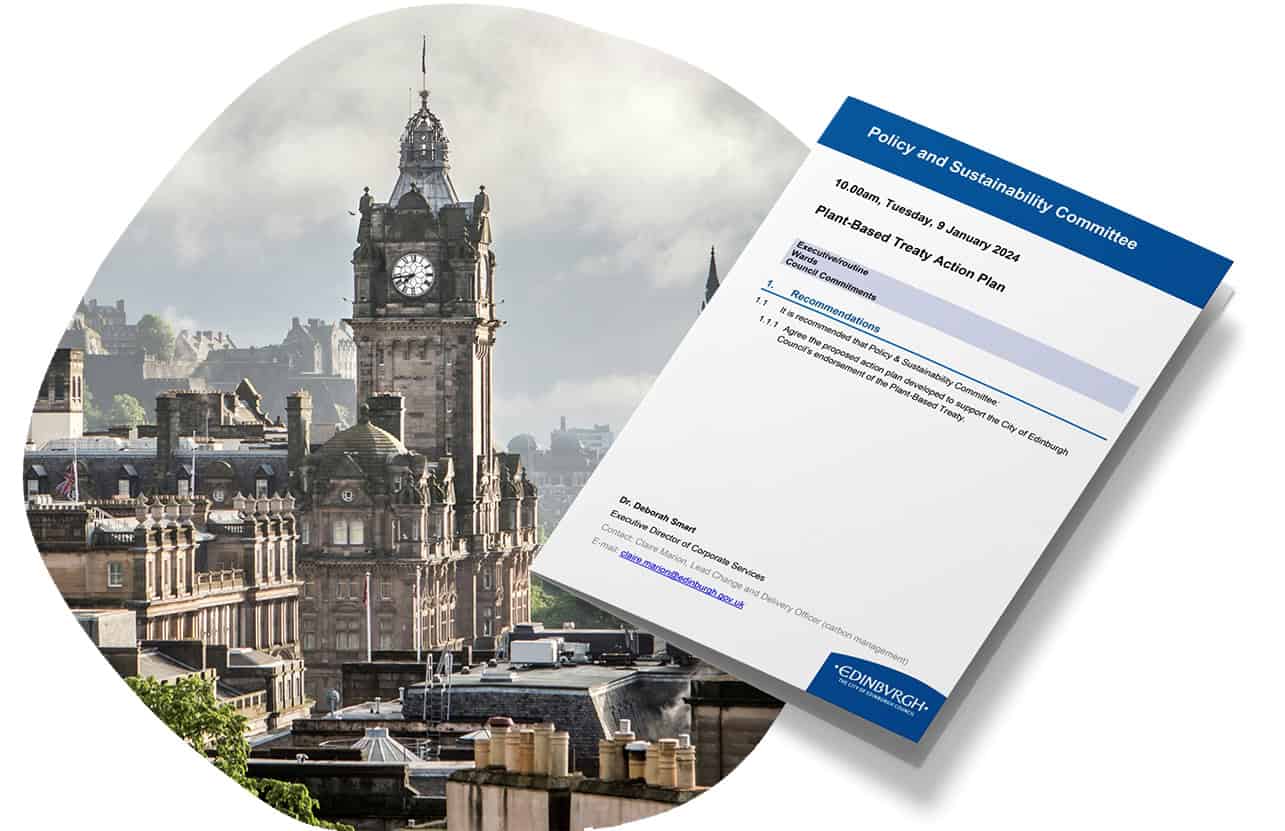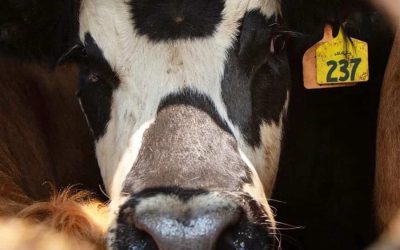Blog
Edinburgh agrees a Plant Based Treaty Action Plan
A model other cities can follow
May 24, 2024
Edinburgh endorsed the Plant Based Treaty in January 2023, as the first European capital in response to the climate emergency. On January 9 this year, the city council of Edinburgh took another step towards implementing its climate ambitions when it passed a Plant Based Treaty action plan.

“Our endorsement of the Plant Based Treaty is setting an intention and a direction of travel, that I feel very good about. I think the city and Scotland have been good at talking about climate change and that we must do more for the environment. By endorsing the Plant Based Treaty, the city has been able to talk about food a bit more challenging, but in a way that it feels welcoming and something everybody can be part of,” says Councilor Ben Parker, a Green Party councillor, elected in 2022.
Councillor Ben Parker emphasizes that while endorsing the Plant Based Treaty initiative is nonbinding and carries no legal risk, it does represent a public acknowledgement that food systems are a key driver of the climate crisis and is a strong statement. He describes the process in the council towards the actual endorsement. It was the community that first initiated the process by sending emails to the council asking the city to endorse the Plant Based Treaty. An impact assessment report was then conducted to explore the implications of endorsing, before taking the final decision.
“Looking back on it, that report was significant. Because it was written by a council officer, it wasn’t pushed forward by a political group. The focus was on how to best tackle climate targets and that food needs to be part of that strategy.”
Other positive experiences include linking the Plant Based Treaty to existing strategies within the council, such as community gardening, community growing and initiatives on food poverty, which are all parts of building a sustainable food system. Ben Parker thinks that they were able to use the Plant Based Treaty as a catalyst to pull many different food projects in the council together.
Nicola Harris delivers a powerful speech to the Edinburgh City Council on why they should make history and endorse the Plant Based Treaty.
“We have been good in talking about other areas, such as fossil fuels and insulating homes to bring electricity down. Maybe food and agriculture has felt like something more difficult. But we have opened the door to this conversation, and it is a conversation that needs to happen, even if it’s not always easy.”
Parker believes that the Plant Based Treaty endorsement will benefit Scotland as a whole. It’s about taking climate change seriously, taking responsibility and defining what the implications are.
A Plant Based Treaty action plan

On January 9, Edinburgh Council took one more step and agreed on a city-wide Plant Based Treaty action plan.
“I think the action plan is very good. It includes a series of actions around awareness-raising and capacity-building, increasing plant-based food, influence and leadership and food waste reduction. There are also very important parts on procurement and contracts, as well as working with other organizations, with the universities and with the festivals, to make sure that we see the impact on these things.”
The council is currently examining carbon labeling tools on menus and they are finalizing the procurement process with the company Klimato.
“Klimato has a platform that will produce carbon labels for all menu options, something that was used during COP26 in Glasgow. We are hoping to start carbon labeling menus very soon, hopefully from April,” Ben Parker says.
The Council has part-funded a one-year Klimato license with Heriot Watt University. The University of Edinburgh has completed the work for four key outlets, with more to follow during the coming year. The Edinburgh International Conference Centre has also started to implement carbon labeling on its menus. An ambitious plan is being implemented in schools as well, concerning healthy, sustainable, and plant-based options.
“Making sure that plant-based food becomes more available, and people suddenly find themselves eating it, because it happens to be there in front of them, is a priority for the city-council”, Parker emphasizes and adds that it is important that the architecture around food makes it easier for people.
By endorsing the Plant Based Treaty and agreeing on the action plan, Parker thinks the political system is catching up, showing leadership and commitment. He is very pleased that the action plan and the motion went through, which means the council will have to report annually on their progress.
Edinburgh Council discuss the Plant Based Treaty Action Plan – Tuesday, 9th January, 2024
“As councillors and decision makers, we will be constantly reviewing the action plan and clearly see what we are committed to deliver and constantly evaluating it on all the different actions. And slowly building them up over time as well. The action plan has given us more of a focus,” Ben Parker says.
The council has many public buildings, and there are often information settings, programs, and events they do.
“Now we will have the World Vegan Day spotlighted in the library. And Veganuary was highlighted to all employees in the city council as part of the newsletter. This did not happen before. It’s all about normalizing plant-based food and getting people to recognize the impact that this has on climate and Nature.”
Inspire other cities to follow
In 2021, Edinburgh endorsed the Fossil Fuel Treaty and received the award of Silver Accreditation Status by the Sustainable Food Places Network in 2022. Today they are a global leading capital when it comes to tackling climate change. Ben Parker hopes the Plant Based Treaty endorsement and the leadership that Edinburgh has shown in the process, can inspire other cities and capitals to follow.
“Since we signed the Treaty, council officers have had meetings with officers from various cities, both in the UK and in Europe, who have reached out to us,” Parker says.
Edinburgh’s Council leader Cammy Day did a short video as part of the Eurocities Food Cities campaign. One of the actions in Edinburgh’s action plan is to encourage twin cities to Edinburgh, to endorse the Treaty.

“We have provided a possible model, and I think that it will be beneficial. Of course, there will be different circumstances in different countries, and in different parts of the UK and Scotland as well. But the fact that we showed that it can be done, and we demonstrated the way, we hope to inspire others as well.”
Parker believes the reason why so many got onboard in the council was because they realized it was many things they were already doing, all in line with what endorsing the Plant Based Treaty is about. The advice he would give to other cities that are thinking of endorsing a call for a Plant Based Treaty, is to start looking at existing projects and strategies that can meet up with the Treaty.
“Endorsing the Plant Based Treaty is to do something on the climate emergency. Because, if you talk about climate change, you need to talk about plant-based food as well. That is the takeover where all of this should be. This is just a natural extension, coming good on the promises that we already are making on climate, for generations to come.”
“Endorsing the Plant Based Treaty is the way forward”

Scotland is well known for its oats. It has been grown in the country since the Bronze Age.
“Scotland’s oats are the best in the world, thanks to the unique climate, famous sea haar and, of course, our fantastic farmers,” said Brose Oats´s CEO Josh Barton. “That’s why we think it’s madness that 97 per cent of all the oat milk consumed in the UK is made from imported oats. We established Brose in 2019 because we thought it made no sense that so much of a drink that was practically invented in Scotland should be imported.”
That journey culminated in a recent Gold Medal for the ‘Product of the Year Award’ at Scotland’s Specialty Food & Drink Show.
“Brose Oats is the only company in the world that produces oat milk with only Scottish oats,” Josh says. “We can even tell you the exact field where the oats came from for every bottle.”
Josh believes that endorsing the Plant Based Treaty is the way forward. He added: “The principles of the Plant Based Treaty are fantastic and so relevant. They capture it all. Environmentally, more and more people believe that the consumption of meat needs to end at some point. Full stop. It is necessary in the long-term if we are to sustain the planet”.
Even if there have been some critical voices linked to the endorsement, he believes that, in the end, all will benefit from it. “In the long run, a transition away from animal agriculture is the way farmers will be able to keep their farms for generations to come.”
He thinks that endorsing the Plant Based Treaty is a way of mainstreaming the plant-based food system, helping producers see the opportunity to get into the plant-based market.
“It is a massive snowball effect. I am confident that the dairy-free shelf will double within the next two years. And increased plant-based farming will benefit local communities and help countries become self-sustained.”
Edinburgh’s Plant Based Treaty action plan focuses on key areas, including:
– Achieving a 20-50 per cent reduction in all meat and dairy consumption by 2050.
– Piloting healthy plant-based snacks when delivering activities with young people in libraries.
– A vegetarian or vegan option is available every day in schools.
– Actions from external organizations, namely Edinburgh Community Food, Food for Life Scotland, Edinburgh International Conference Centre, the Chamber of Commerce, the University of Edinburgh, Heriot-Watt University, and Creative Carbon Scotland.
– The council is currently finalizing the procurement process with carbon labeling company Klimato. The Council has part-funded a one-year Klimato license with Heriot Watt University. The University of Edinburgh has completed the work for four key outlets, and the Edinburgh International Conference Centre has started to implement carbon labeling on their menus.
– The council catering team started a cooking school for catering staff last year, which includes a cookery session focusing on vegetarian and vegan dishes, as well as sessions on ingredient provenance.
– The Council is also working with the Guardians of Grub who offer educational resources on food waste reduction and actively promotes the Veg Power campaign.
– Organizing a session for the new Assembly Rooms’ Catering Panel to share best practice and resources on ways caterers can reduce food-related emissions and promote Edinburgh’s endorsement of the Plant-Based Treaty, encouraging caterers to increase the availability of plant-based options.
– Engaging with the food industry to encourage them to sign-up to the Edinburgh Climate Compact and to the Plant-Based Treaty.
– Writing to all of the City of Edinburgh Council’s sister and twin cities (where appropriate), as well as to metro mayors to encourage them to endorse the Plant-Based Treaty.
– Writing to the First Minister to encourage the Scottish Government to support the Plant-Based Treaty.
Read the whole action plan here.

Miriam Porter is an award-winning writer who writes about veganism, social justice issues, and eco-travel. Miriam currently lives in Toronto with her son Noah and many rescued furry friends. She is a passionate animal rights activist and speaks up for those whose voices cannot be heard.

Anne Casparsson is a writer and ethicist, who has worked with communication and journalism in different capacities, for more than twenty years. She writes about animal rights, veganism, sustainability, justice, and peace related issues. Anne is based in Stockholm where she lives with her family. She is a dedicated voice for the animals.
More from the blog
Huge if London will lead the way forward
By Anne Casparssan
How a small Sussex town became the first in Europe to endorse the Plant Based Treaty
By Anne Casparssan
Your Leather Items Are Not Eco-Friendly
By Miriam Porter



